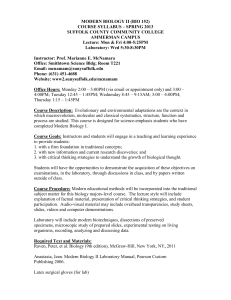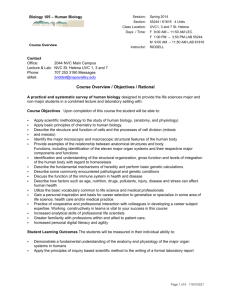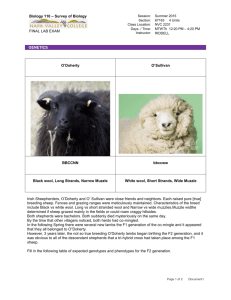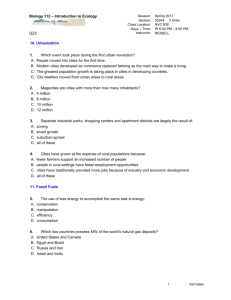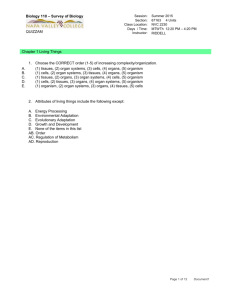BIO 110 SM 2015 67163 Course Overview
advertisement
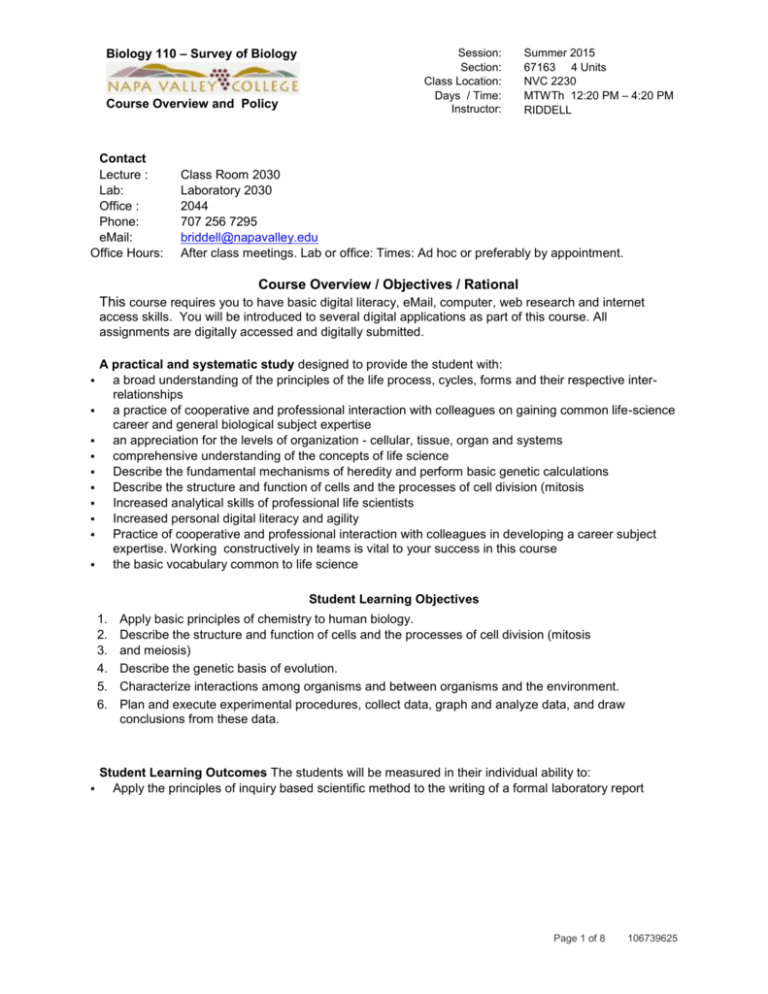
Biology 110 – Survey of Biology Course Overview and Policy Contact Lecture : Lab: Office : Phone: eMail: Office Hours: Session: Section: Class Location: Days / Time: Instructor: Summer 2015 67163 4 Units NVC 2230 MTWTh 12:20 PM – 4:20 PM RIDDELL Class Room 2030 Laboratory 2030 2044 707 256 7295 briddell@napavalley.edu After class meetings. Lab or office: Times: Ad hoc or preferably by appointment. Course Overview / Objectives / Rational This course requires you to have basic digital literacy, eMail, computer, web research and internet access skills. You will be introduced to several digital applications as part of this course. All assignments are digitally accessed and digitally submitted. A practical and systematic study designed to provide the student with: a broad understanding of the principles of the life process, cycles, forms and their respective interrelationships a practice of cooperative and professional interaction with colleagues on gaining common life-science career and general biological subject expertise an appreciation for the levels of organization - cellular, tissue, organ and systems comprehensive understanding of the concepts of life science Describe the fundamental mechanisms of heredity and perform basic genetic calculations Describe the structure and function of cells and the processes of cell division (mitosis Increased analytical skills of professional life scientists Increased personal digital literacy and agility Practice of cooperative and professional interaction with colleagues in developing a career subject expertise. Working constructively in teams is vital to your success in this course the basic vocabulary common to life science Student Learning Objectives 1. 2. 3. 4. 5. 6. Apply basic principles of chemistry to human biology. Describe the structure and function of cells and the processes of cell division (mitosis and meiosis) Describe the genetic basis of evolution. Characterize interactions among organisms and between organisms and the environment. Plan and execute experimental procedures, collect data, graph and analyze data, and draw conclusions from these data. Student Learning Outcomes The students will be measured in their individual ability to: Apply the principles of inquiry based scientific method to the writing of a formal laboratory report Page 1 of 8 106739625 Biology 110 – Survey of Biology Course Overview and Policy Session: Section: Class Location: Days / Time: Instructor: Summer 2015 67163 4 Units NVC 2230 MTWTh 12:20 PM – 4:20 PM RIDDELL Objective and Outcomes Measurement Student achievement will be measured via several reading activities in exam and quiz formats including; Multiple-choice, matching, fill-in, questions, sentences and classification and data tables; Identification of anatomical and physiological components of schematics, diagrams, illustrations, photographs and medical digital images; Student achievement will be measured via several writing activities including; Compiling, reporting and presenting compendia of biological histological and molecular topics; Internet research and using scientific methods, performing laboratory investigations of microscopic, chemical, physiological and genetic data and reporting their findings in approximately 10 formal lab reports; Student achievement will be measured via at least one oral presentation activity including; Researching, and using scientific methods, performing laboratory investigations of genetic modeling to explain processes of inheritance and micro-evolution. Page 2 of 8 106739625 Biology 110 – Survey of Biology Course Overview and Policy Session: Section: Class Location: Days / Time: Instructor: Summer 2015 67163 4 Units NVC 2230 MTWTh 12:20 PM – 4:20 PM RIDDELL Equipment, Text, Materials and Resources: Digital World - Bring cell phones, laptops, and memory sticks to every class session. Internet: Campus-Wide WiFi is available Computers o Laptop Computers; Windows 7 OS with MS Office will be provided in Lab. o Alternate [Strongly advised] Personal Lap Top Computer or Tablet [Mac or PC] with Wireless Modem Software: o Windows 7 OS and MS Office 2007 provided on all NVC Computers o PC owners MS Windows 7, XP, or 8 and MS Office 2007 or later ed. Or equivalent o MAC owners MAC OS X and MS Office 2007 or later ed. Or equivalent o Free alternate software applications equivalent to MS Office http://download.openoffice.fm/free/ https://drive.google.com/ Google Drive / Google Docs External Memory Stick 2GB Smart Phone with camera that allows PHOTO upload to laptop or internet Textbook: o Biology – Concepts and Connections Campbell / Reece et al. 5th, 6th, 7th 8th, 9th ed. Or Equivalent o Publisher Pearson http://www.pearsoned.com/shop/ o ISBN 9780321696816 [Print or eBook required…Ok to share expenses] Text Book On Line Resource: Mastering Biology http://www.masteringbiology.com/ o Course Access MBRIDDEL TBD o eBook included , Practice Exams / Quizzes, Animations, Tutorials, etc., [receommended for students that need additional on line help] Lab Manual: Provided on Line Notebook 50 + pages, lined or plain for raw data and observations Instrumentation [provided] o Binocular Microscopes o Dissection Microscopes o Spectrometers o Electrophoresis chambers All supplies and safety equipment [provided] Specimens and Materials: [provided] Illustrations, Tables, Photographs, Charts, Models Microbial, Protist, Animal and Plant specimens, living and preserved , gross and microscopic, for study and examination Web Resources The instructor maintains a course website that includes the current course syllabus, outlines, and study guides. The site is updated regularly to provide links to current course materials. These resources are provided only for use by students enrolled in this section of this course. http://www.napavalley.edu/people/briddell/Pages/BIOL-110-Biology.aspx Page 3 of 8 106739625 Biology 110 – Survey of Biology Session: Section: Class Location: Days / Time: Instructor: Course Overview and Policy Summer 2015 67163 4 Units NVC 2230 MTWTh 12:20 PM – 4:20 PM RIDDELL Policy Safety - See Laboratory Safety Policy Attendance Attendance is an important part of learning Biology; therefore attendance will be monitored in lab. Attendance may be taken and / or quizzes will be given at any time during the scheduled class period. If you miss a quiz you will not be allowed to make it up. Note: The College Catalog states: “…a student who has been absent for as many times as a class meets each week will have exhausted this provision for unavoidable absences. Further absences may cause the instructor to drop the student from the class.” Note: Doctors appointments and child care issues are considered absences. Grades Course requirements include regular attendance in lectures and laboratories, successful completion of the lecture and laboratory examinations, and participation in laboratory assignments. Regular attendance is essential; however, attendance alone does not earn a passing grade. History teaches that every student will need to spend some amount of dedicated study time outside of class hours in order to earn a grade of C or better. Note: Study, study, study! Study = memorizing! Early, daily and often are good practices! [See Study Practices guide]. Scale Metric Pts per Metric QTY ST % of Grade Achievement Letter Grade Lecture Quizzams 50 5 250 18% 100% + A+ Lab Quizzams 50 2 100 7% 90% + A Midterm Lecture Exams 100 0 0 0% 80 - 89% B Midterm Lab Exams 100 0 0 0% 70 – 79% C Lab Reports 10 75 10 750 55% 60 – 69% D Field Trip / Bio Monitoring 100 0 0 0% < 60% Fail Lab Maintenance 10 6 60 4% Team Presentations 100 2 200 15% Other and XC 5 10 50 4% Final Lecture Exam 200 1 200 15% Final Lab Exam 100 1 100 7% TOTAL [approx] 790 30 1360 100% * Actual number of quizzes and lab participation totals are estimates Page 4 of 8 106739625 Biology 110 – Survey of Biology Course Overview and Policy Session: Section: Class Location: Days / Time: Instructor: Summer 2015 67163 4 Units NVC 2230 MTWTh 12:20 PM – 4:20 PM RIDDELL Your course grade will be based on your performance on lecture exams, laboratory exams, quizzes, and lab participation [which includes regular attendance, performance and proportionate contribution on laboratory experiments, organization, helpfulness, initiative, etc.]. Grading adheres to the point scale shown above, but adjustments may be made for overall performance and observed citizenship, leadership, initiative, liaison, etc when determining the final grade. Examinations and Other Assignments Lecture Exams and Quizzams may consist of matching, multiple choice, and true/false, short answer and short essay questions. The four midterm lecture exams will emphasize the material covered since the previous exam and as a general rule consist of approximately 70% current topics and 30% cumulative topic. Your assimilation of all material presented in the textbook augments and reinforces the information presented / highlighted in lecture. Select samples from all sources of information, lecture, text, and lab write up, and current events, may be included on any single lecture. The final exam will be comprehensive and amortized equally across topic sections of the course. Laboratory Exams and Quizzams will be given on the dates shown on the schedule. Any changes to this schedule will be announced in class. The lab exams will emphasize identification of gross and microscopic structures on anatomical models, dissected specimens, and microscope slides. Lab exams will include problem solving, and demonstration of your ability to perform, and your understanding of, the lab exercises covering subjects since the previous lab exam. A series of stations will be set up in the lab / classroom. You will have approximately two minutes at each station and will move from one station to the next until you complete the exam. You will not be allowed to return to any previous station in order to check your answers. The lab exams will usually begin 15 30 minutes after the normal lab starting time and the lab will be closed prior to the exam to allow for setup. Be on time for lab exams; you will not be allowed to make up missed stations. Generally, you will have a prescribed time limit for completing this type of practical. This is usually shorter than normal laboratory period. Short quizzes may be given from time to time during the lab periods. The quizzes will generally cover the material of that day’s or the immediately preceding lab exercise and lecture information. These quizzes may or may not be announced in advance. To prepare for the quizzes and for the lab in general, read the current lab exercise and review your lab notes prior to each lab, maintain your current reading schedule and review your lecture outlines. Lab Reports will be assigned during select sections of the course. All reports will be submitted in digital format. Students will not be allowed to use cell phones or MP3 players during exams….but are encouraged to bring them to class and especially laboratory and field activities. Students are NOT allowed to record my voice or take my picture. Make-up exams There are NO possible make-up opportunities for laboratory exams because they are lab practicals! In rare instances and for extraordinary circumstances, a makeup lecture exam may be required / allowed. You must call [707 864 7000 X5584] or e-mail me @ [briddell@napavalley.edu] before the exam in order to be allowed to make-up the exam! You will NOT be allowed to make-up a lecture exam if you contact me after the exam. Make-up exams will be given at mutually determined times. It is your responsibility to make arrangements for scheduling a make-up exam. If you fail to do so, you will receive a zero for the missed exam. Assignments and lab reports will be accepted for credit after the agreed upon time and date they are due but will include a penalty for tardiness, approximately 1.5% per day late. Computer crashes, printer problems, internet, team logistics, car, family, BFF, Page 5 of 8 106739625 Biology 110 – Survey of Biology Course Overview and Policy Session: Section: Class Location: Days / Time: Instructor: Summer 2015 67163 4 Units NVC 2230 MTWTh 12:20 PM – 4:20 PM RIDDELL traffic and other problems are a part of life, but they are not acceptable excuses for turning your assignments in late! If they are late, they are. Ethics Professional Conduct and Communication are expected. Formal and professional conduct is expected of you at all times in lecture, lab and on campus. Your practice of study, communication, politic, inter-personal and group interaction skills, generally accepted and expected of a medical-professional, begins and / or continuously improves in this class. Pro-actively shared, cooperative assistance is highly valued in the professional setting because it is a critical factor in providing high quality health care, patient, peer and medical practice safety and quality scientific process. Because unprofessional, disruptive, and / or rude behavior demonstrated by you is harmful to these objectives, and to the professional setting to which you aspire, its demonstration in this educational setting toward anyone, including me, is unacceptable and will result in your immediate discharge from the classroom / lab. Your grade will be negatively affected based upon the severity of the offense. Cheating / Plagiarism - Cheating / Plagiarism are not tolerated in any form. Cheating defined: Copying, in part or in whole, from another’s test or other evaluation instrument or obtaining answers from another person during the test. Submitting work previously presented in another course, if contrary to the rules of either course. Using or consulting, sources or materials not authorized by the instructor during an examination Altering or interfering with grading or grading instructions Sitting for an examination by a surrogate, or as a surrogate Any other act committed by a student in the course of his or her academic work, which defrauds or misrepresents, including aiding or abetting in any of the actions defined above Talking or consulting during the test with another person Giving other students information that allows the student an undeserved advantage on an exam, such as telling a peer what to expect on a make-up exam or prepping a student for a test in another section of the same class Plagiarism defined:: The act of incorporating or representing another’s artistic/scholarly or similar works as one’s own Plagiarism may either be deliberate or unintentional, but it must be avoided with all due diligence. Other: Lewd, disruptive, discourteous, inappropriate behavior and / or attire is not acceptable and will not be tolerated Consequences of academic dishonesty, or any un-acceptable behavior: Upon the first infraction of academic dishonesty, the instructor may do one or more of the following: Give a lower or failing grade on the assignment or exam Refer the student to the Dean and/or the Vice President of Student Services for student disciplinary action. In the event of a second infraction, upon consultation with the Dean, the instructor may do one or more of the following: Give a lower or failing grade on the assignment or exam Refer the student to the Dean of the science Department and/or Vice President of Student Services for student disciplinary action including failing or removal from the course Page 6 of 8 106739625 Biology 110 – Survey of Biology Session: Section: Class Location: Days / Time: Instructor: Course Overview and Policy Summer 2015 67163 4 Units NVC 2230 MTWTh 12:20 PM – 4:20 PM RIDDELL Important Dates: JUN 18 Last day to drop and receive a refund of course fees. JUN 24 Last day to drop a class without receiving a grade of “W” See ORA Last day to request Credit/No Credit grading JUL 17 Last day to drop a class with a grade of “W” Note: A letter grade must be assigned for any class not dropped by this date. It is the student’s responsibility to drop a class through the Office of Records and Admissions. NOTE: It is the student's responsibility to fill out the appropriate forms in order to be dropped from the course. Do not assume that the instructor will drop you from the course if you stop attending class. If you stop attending the class, and if you fail to officially drop the course by filing for drop within the appropriate period, and with the Records Office, you will receive a grade of Fail in the course. Special Needs: Students with learning disabilities, who believe that they may need accommodations in this class, are encouraged to contact Diagnostic Learning Services to schedule an appointment with a Learning Disabilities Specialist as soon as possible to ensure that such accommodations are implemented in a timely fashion. Authorization from Special Services is required before any accommodation can be made. Students requiring accommodations for physical or other types of disabilities should schedule a time to meet the Counseling Department and ADVISE ME IMMEDIATELY on the first day of the class. Office Hours, Other: As stated above Same days as class meeting and directly before or after class with mutual understanding of a preestablished appointment. I have read, understand and agree to abide by the above course policy and any additional instruction, governing and / or safety direction provided by the instructor. BIO 110 Course Overview and Policy Please print Student ID #: Please print your name: Please sign and date: 1 0 1 2 3 4 5 6 replace this # with your ID Anyone Somebody Signed: : Anyone Somebody Date: 2015, MM, DD Please sign and date this document, save a copy to your desktop, change the file name to include your first initial and your complete last name, then place your signed copy in the drop box on the course web site prior to your second class session. Use a legible script font or a Digital Signature. Example File Name: Page 7 of 8 106739625 Biology 110 – Survey of Biology Course Overview and Policy Session: Section: Class Location: Days / Time: Instructor: Summer 2015 67163 4 Units NVC 2230 MTWTh 12:20 PM – 4:20 PM RIDDELL BIO 015 SM 2014 60150 Course Overview Somebody 140616 Page 8 of 8 106739625

